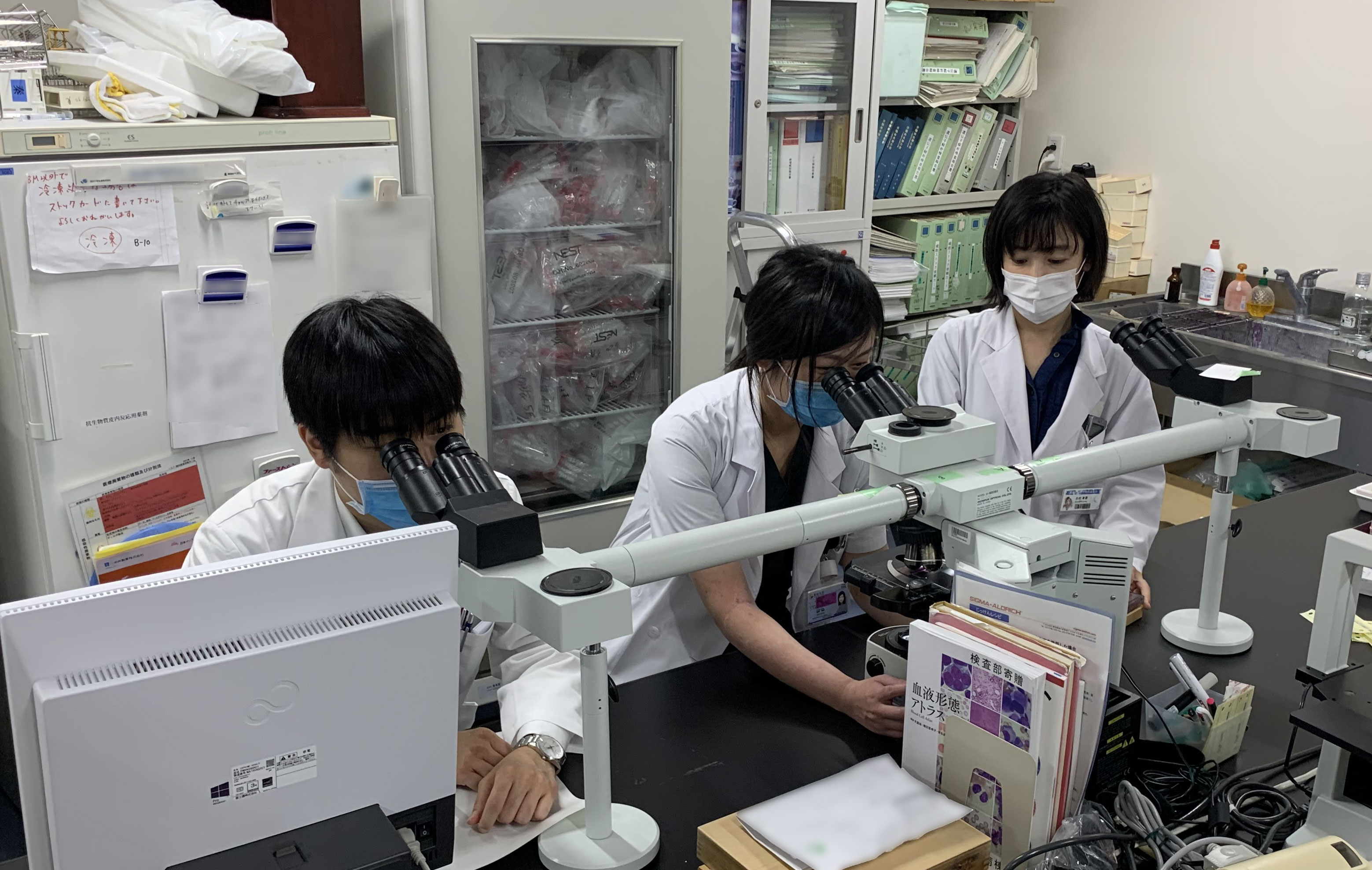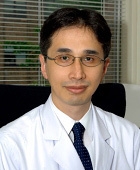Centers & Services
Top > Centers & Services > Clinical Services > Hematology and Oncology
Hematology and Oncology

The Department of Hematology and Oncology provides medical services for patients with various blood disorders, including anemia and thrombocytopenia, and neoplastic disorders such as leukemia and malignant lymphoma.
Medical services
Outpatient services are available each morning and afternoon on weekdays. The department has a constant inpatient load of approximately 65 patients who receive combined modality therapy including stem cell transplantation in cooperation with the Department of Cell Therapy and Transplantation Medicine.
Diagnosis and treatment policy
With the utmost emphasis placed on providing medical care that satisfies patients, staf f and patients discuss treatment together to make it holistic. Individual cases are discussed by the entire staff to select the most effective treatment and achieve advanced medical care.
Specialties
The department has well-established experience in applying combined modality therapy including chemotherapy and transplantation in treating leukemia, malignant lymphoma, and other malignant tumors.
Target diseases
Almost all blood disorders including acute leukemia, chronic myeloid/lymphocytic leukemia, adult T-cell leukemia, lymphoma, true erythrocytosis, essential thrombocythemia, primary myelofibrosis, myelodysplastic syndrome, malignant lymphoma, multiple myeloma, aplastic anemia, hemolytic anemia, immune (idiopathic) thrombocytopenia, and hemophilia.
Advanced treatments/ Specialized treatments
Genome Analysis Diagnosis of Genetic and Hematopoietic Tumors
With the cooperation of Department of Clinical Laboratory, we incorporate genetic analysis using PCR and DNA sequencing methods based on the latest findings, and use the analysis results for diagnosis, selection of treatment methods, and early detection of recurrence after treatment.
Autologous and Allogeneic Hematopoietic Stem Cell Transplantation
Hematopoietic stem cell transplantation is a treatment in which hematopoietic stem cells obtained from the patient or a donor are transfused after chemotherapy or radiation therapy. Autologous transplants are mainly performed for malignant lymphomas and multiple myeloma, while allogeneic transplants are performed for higher-risk blood tumors. In recent years, allogeneic transplants can safely be performed on elderly patients, which allows us to actively provide the transplants to patients of all ages including elderlies over 65 years-old. With the strong suppor t from nurses and pharmacists, we are also well-equipped to manage various complications that may occur after the transplantation.
CAR T-Cell Therapy
CAR T-cell therapy with Chimeric Antigen Receptor (CAR) is attracting attention as the latest immuno-cell therapy for hematological tumors, and is expected to be effective for malignant lymphoma and acute lymphoblastic leukemia in young patients. In cooperation with the Department of Blood Transfusion and the Cell Processing Center, we construct and transfuse CAR T-cells from/ to patients who need them with the aim to enhance the effectiveness of the therapy.
HLA-haploidentical transplant
Conventional hematopoietic stem cell transplants require that the blood types known as HLA match at least 90 percent, and it can be time-consuming to find a match. In recent years, the development of transplant management methods has made it possible to perform transplants from donors whose HLA is halfmatched. Called haploidentical transplantations, the department performs this procedure for patients who require it to overcome a disease.
Treatment of Central Nervous System Malignant Lymphoma
Among malignant lymphomas, those arising from the central nervous system (brain and spinal cord) are considered to require special treatment. In our department, we provide numerous treatments for CNS malignant lymphomas, including autologous transplantation, in order to improve the conditions of prognosis.
Molecular Targeted Therapics
We are actively pursuing treatments for malignant tumors like leukemin and lymphoma using cuttinng-edge drugs such as bispecific antibodies and antibody-drug conjugates(ADCs). Our goal is to improve treatmante effectiveness and conquer these discases.
Mineo Kurokawa
Departments/Divisions
Department of Hematology and Oncology, Department of Cell Therapy and Transplantation Medicine
Titles
M.D. , Ph.D.
Expertise/Specialties
Hematological malignancies
Research Interests
Leukemia
Languages
Japanese, English
Major diseases treated in this department and numbers of in- and outpatients
| Disease name | Number of inpatients | Number of outpatients |
|---|
| 1 | Acute leukemia | 43 | 1,078 |
| 2 | Chronic myelogenous leukemia | 2 | 873 |
| 3 | Myelodysplastic syndrome | 27 | 983 |
| 4 | Malignant lymphoma | 172 | 4,374 |
| 5 | Multiple myeloma | 22 | 582 |
Total numbers of patients in 2015
Areas of expertise, treatment and examination methods
Diseases
- Acute leukemia
- Malignant lymphoma
- Myelodysplastic syndrome
- Chronic myeloid leukemia
- Multiple myeloma
- Aplastic anemia
- ITP (idiopathic thrombocytopenic purpura)
- Erdheim-Chester disease
Treatment methods
- Multi-drug chemotherapy
- Allogeneic peripheral blood stem cell transplantation
- Allogeneic bone marrow transplantation
- Autologous peripheral blood stem cell transplantation
- Umbilical cord blood transplantation
- Immunosuppressive therapy
- Molecular-targeted therapy
- Antibody Medicine
Examination methods
- Marrow puncture
- Lymph node biopsy
- Cell surface antigen analysis using flow cytometry (bone marrow and lymph nodes)
- Genetic diagnosis (detection and monitoring of genetic abnormalities due to hematologic diseases)
- Diagnostic imaging, such as CT and FDG-PET
Numbers of major operations and treatments performed
| Name of operation/treatment | Number |
|---|
| 1 | Allogeneic bone marrow transplantation | 11 |
| 2 | Autologous peripheral blood stem cell transplantation | 12 |
| 3 | Umbilical cord blood transplantation | 1 |
(2015)
Numbers of major and specialized examinations conducted in this department
| Name of examination | Number |
|---|
| 1 | Bone marrow examination | 800 |
(2015)

